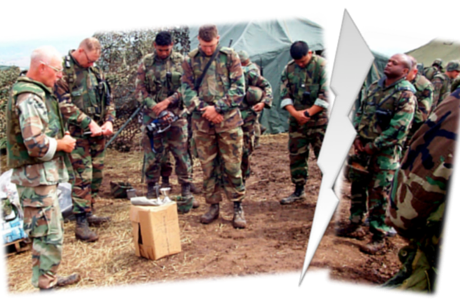Chaplains Are Atheists In Foxholes
This Memorial Day, the Washington Post examined how some chaplains struggle to reconcile their faith with the terrors of war: “What happens when the military chaplain is shaken by war” by Michelle Boorstein. The article provides some candid and real struggles of chaplains who see the physical and spiritual destruction inherent in war. I refer not to spiritual destruction in a supernatural sense but in the natural sense of families torn apart, values challenged, and emotional support being knocked away as life becomes unbearable.
Matthew Williams is featured in the article providing his pre-war go-to faith that suffering, including war, is tolerable to God because it is temporary. He and others found their pre-war go-to faith lacking in the face of real war. Some chaplains, in foxholes, become atheists. Some return to their faith and some don’t. An angry or distraught Christian is no more atheist than a scared atheist is Christian. But some really do find new values and new world views in the face of trauma.
In examining how beliefs change, one option lost is the Humanist option. As chaplains and soldiers see their faith challenged in war, they should consider re-investing in their faith to look for familiar options and community they need in time of struggle. But there is a point at which counselors, social workers, and even chaplains should see that a person’s faith is simply not working. Or that faith is doing more harm than good. It’s ok to lose faith. Better said: It’s ok to set faith aside in favor of science and reason and human-based values. A one-size-fits-all faith solution is not healthy. Humanist and other non-theistic options are available and inspiring and sorely needed for a military more atheist than Jewish or Muslim or Hindu.

What about those unhelped by prayer?
The point is not to force anyone’s views to change, but to provide much-needed alternatives with one’s faith fails. There’s no law against changing one’s beliefs, even changing back one’s beliefs, but denying or hiding options amplifies trauma.
Unfortunately, current chaplains continue to turn their back on humanists in need. A trainee at Ft Jackson is asking for Humanist services and volunteers are ready, yet chaplains are refusing to accommodate his request. An Airman deployed from Ft Campbell is overseas and asking for recognition as a Humanist, and chaplains are refusing his request. These personnel quietly work within the system hoping that one day some portion of the 5000 non-humanist chaplains will open their hearts or military commanders will step in to force chaplains to serve all equally.
There are military chaplains currently serving who identify as Humanist and if they were to out themselves as such, they would lose their existing endorsement and then be drummed out of the service because they don’t believe what the chaplaincy finds acceptable. The Navy rejected an opportunity for an Oxford-educated theologian endorsed by the Humanist Society to serve as a military chaplain. That candidate stood poised to bring to the US distinguished service like that of newly-promoted Colonel Erwin Kamp, senior chaplain in the Dutch Military, who have shown Humanist Chaplaincy is a reality. There seems to be no movement toward diversity of belief when it comes to serving those who have found supernatural faith is not comforting.
Readers should look closely at the real and honest struggles laid out in Boorstein’s article and compound those problems with the refusal of the current chaplaincy to accommodate humanists and other nontheists. Imagine a Christian or Jew trying to deal with the problems of war with no Jewish services, no Christian chaplains. That trauma in the absence of support is the reality with which all US military Humanists now struggle.
